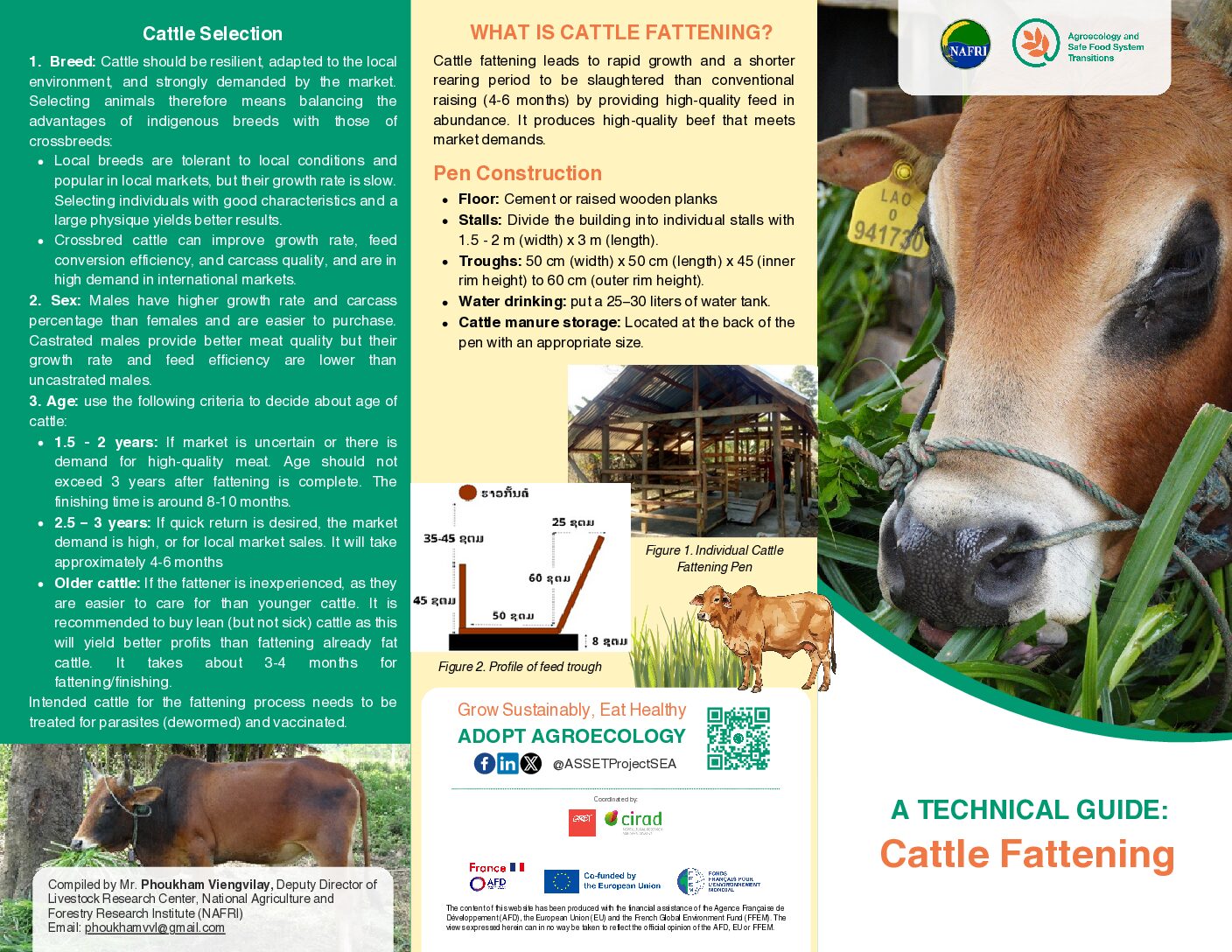Weaver Ant: a natural ecological practice to protect cashew nut plantations
Did you know weaver ants are helpful for pest control? Weaver ants are considered farmers’ friends as they protect crops like cashews from pests. Introducing weaver ants is just one of many techniques used in Agroecological Crop Protection (ACP), which combines the principles of agroecology, Integrated Pest Management (IPM), Organic Agriculture, and regenerative agriculture. This natural solution reduces crop damages, improves yields and nut quality, ends the need to spray chemical pesticides, reduces production costs and increase’s farmers profit margins. Moreover, it maintains the health of farmers and the environment while also improve the resilience of farming systems. Watch this video to learn about weaver ant management techniques and the successful experiences of organic cashew farmers in Preah Vihear province.
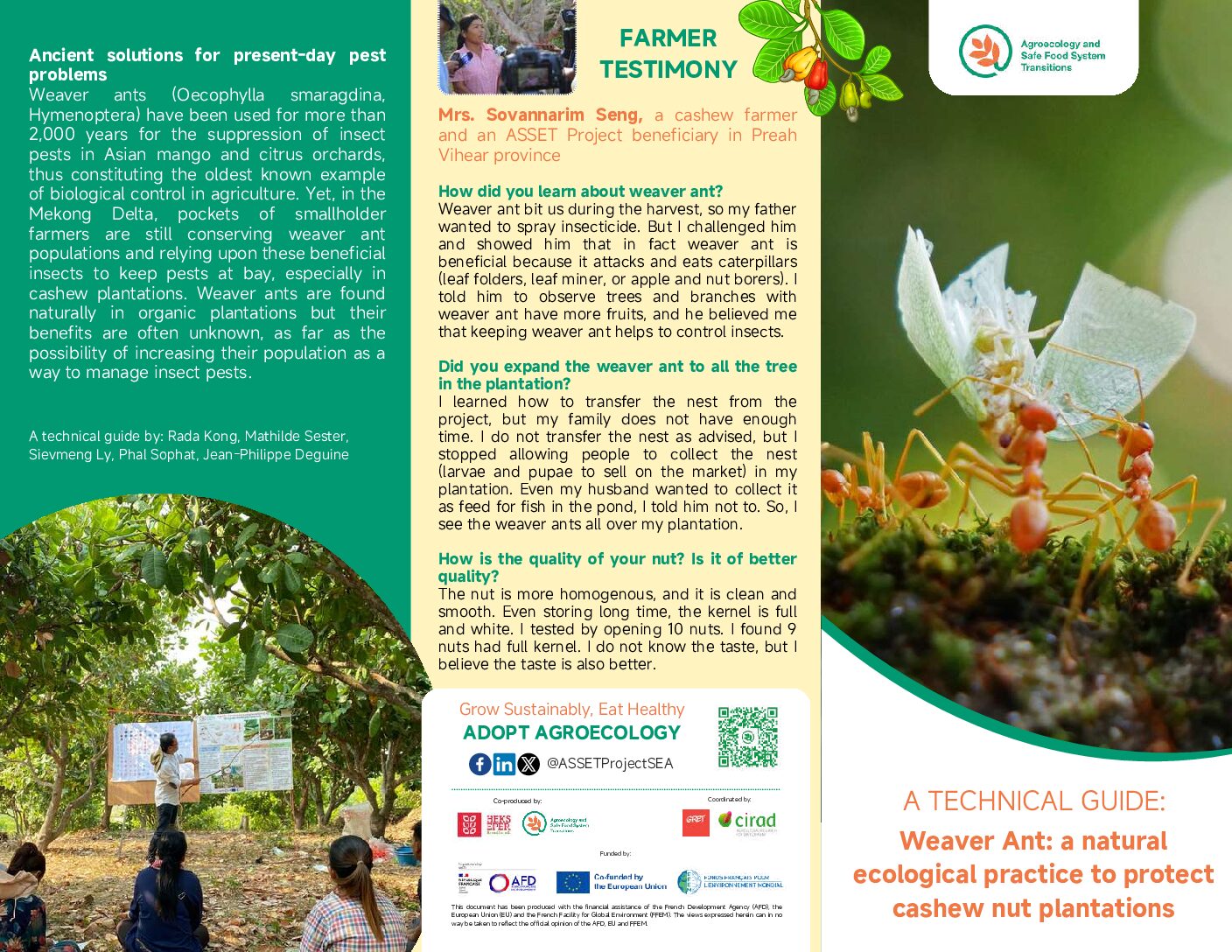
Weaver ant, a natural ecological practice to protect cashew nut plantations
Weaver ants (Oecophylla smaragdina, Hymenoptera) have been used for more than 2,000 years for the suppression of insect pests in Asian mango and citrus orchards, thus constituting the oldest known example of biological control in agriculture. Yet, in the Mekong Delta, pockets of smallholder farmers are still conserving weaver ant populations and relying upon these beneficial insects to keep pests at bay, especially in cashew plantations. Weaver ants are found naturally in organic plantations but their benefits are often unknown, as far as the possibility of increasing their population as a way to manage insect pests.
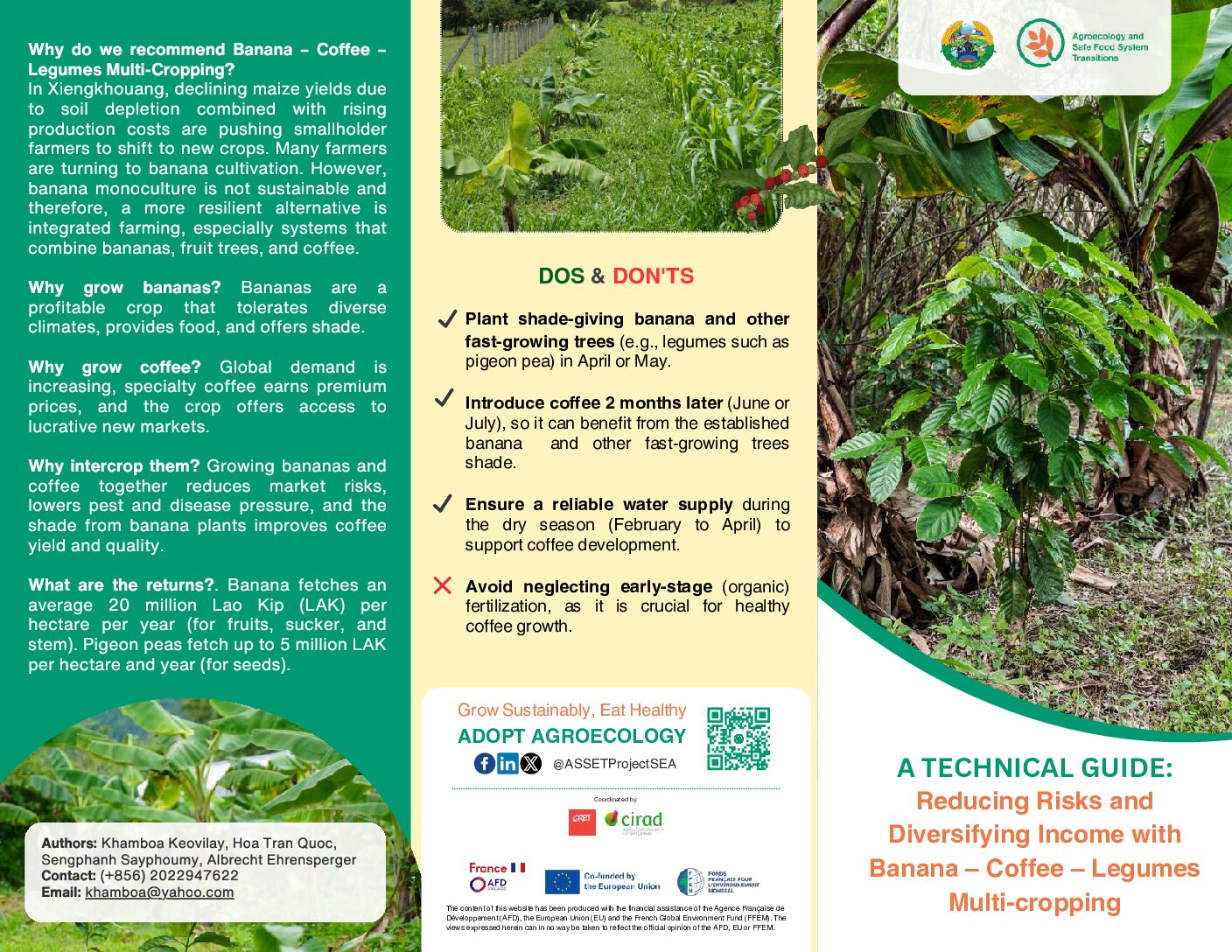
Reducing Risks and Diversifying Income with Banana – Coffee – Legumes Multi-cropping
In Xiengkhouang, declining maize yields due to soil depletion combined with rising production costs are pushing smallholder farmers to shift to new crops. Many farmers are turning to banana cultivation. However, banana monoculture is not sustainable and therefore, a more resilient alternative is integrated farming, especially systems that combine bananas, fruit trees, and coffee.
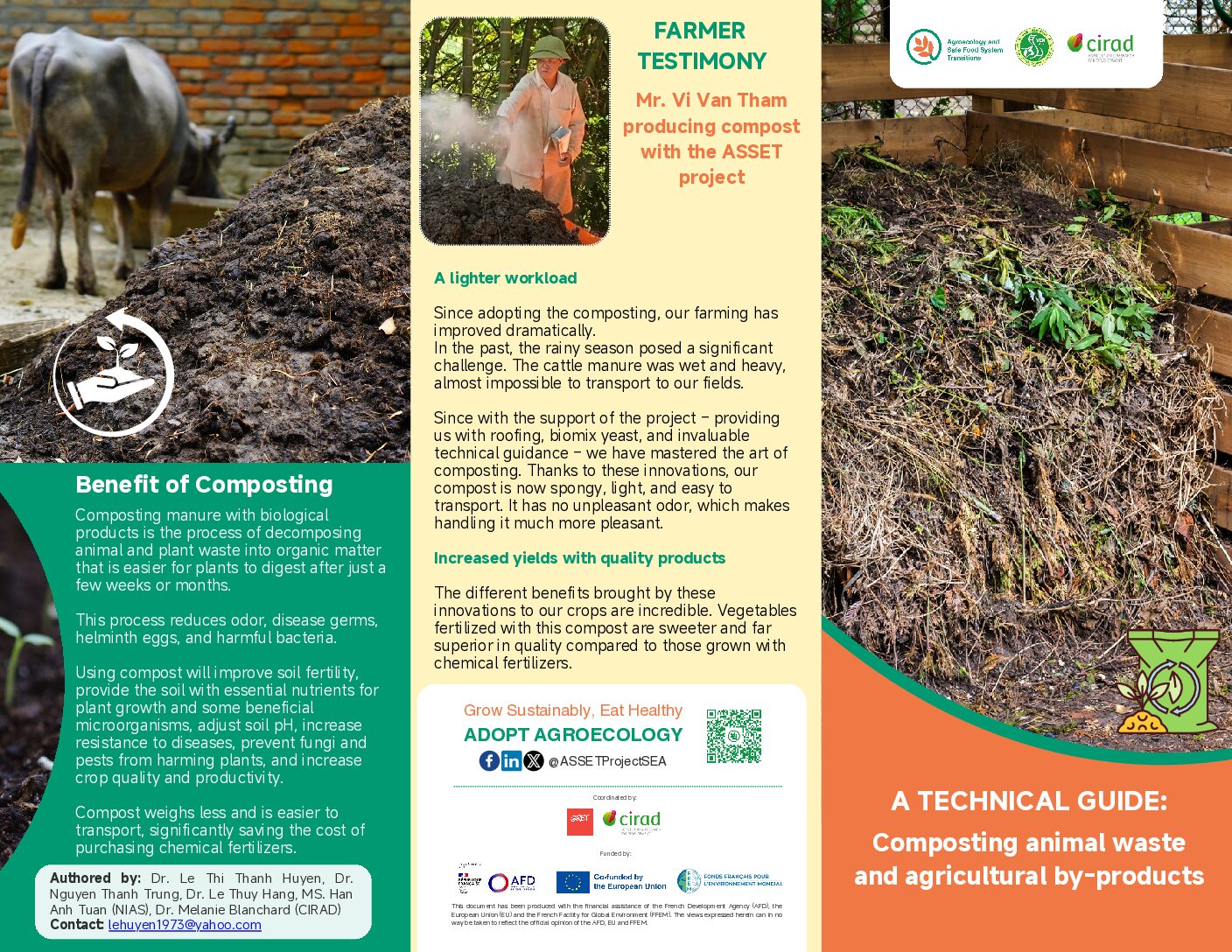
Ủ phân hữu cơ từ chất thải chăn nuôi và phụ phẩm nông nghiệp
Hướng dẫn kỹ thuật: Ủ phân hữu cơ từ chất thải chăn nuôi và phụ phẩm nông nghiệp. Ủ phân bằng chế phẩm sinh học là quá trình phân hủy các chất thải động vật, thực vật thành chất hữu cơ dễ tiêu hóa hơn cho cây trồng chỉ sau vài tuần hay vài tháng. Ủ phân hữu cơ giúp giảm mùi hôi, tiêu diệt hạt cỏ dại và tiêu diệt một số mầm bệnh, trứng giun sán và vi khuẩn có hại.
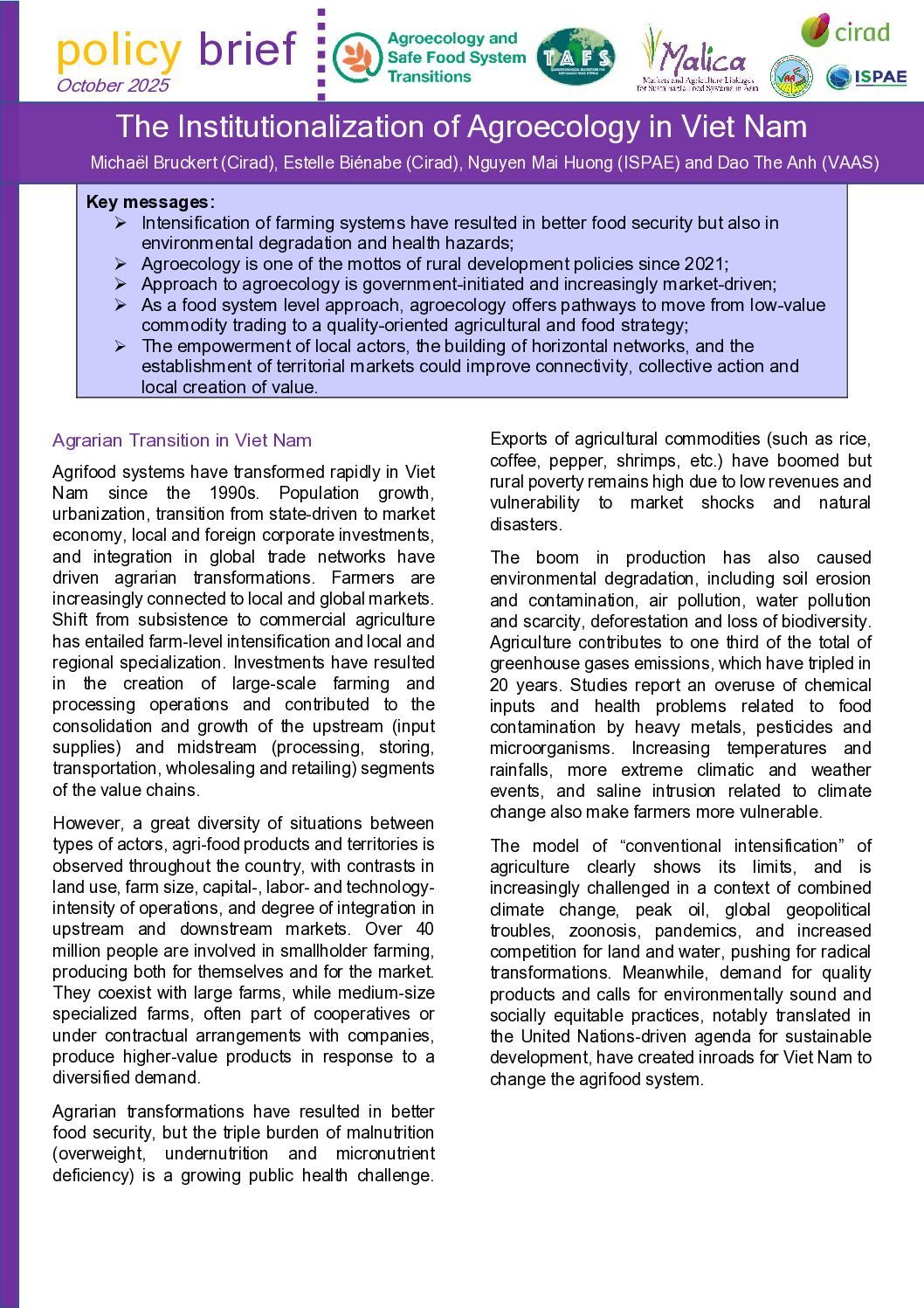
The Institutionalization of Agroecology in Viet Nam
This policy brief, after reviewing agrarian transition, agricultural public policies, actors and organisations supporting Agroecology in Vietnam, presents a rationale to develop agroecology and gives recommendations on different interventions and approaches that could be leveraged by public authorities and other stakeholders to catalyze and bring to scale a full-fledged agroecological transition in Viet Nam.
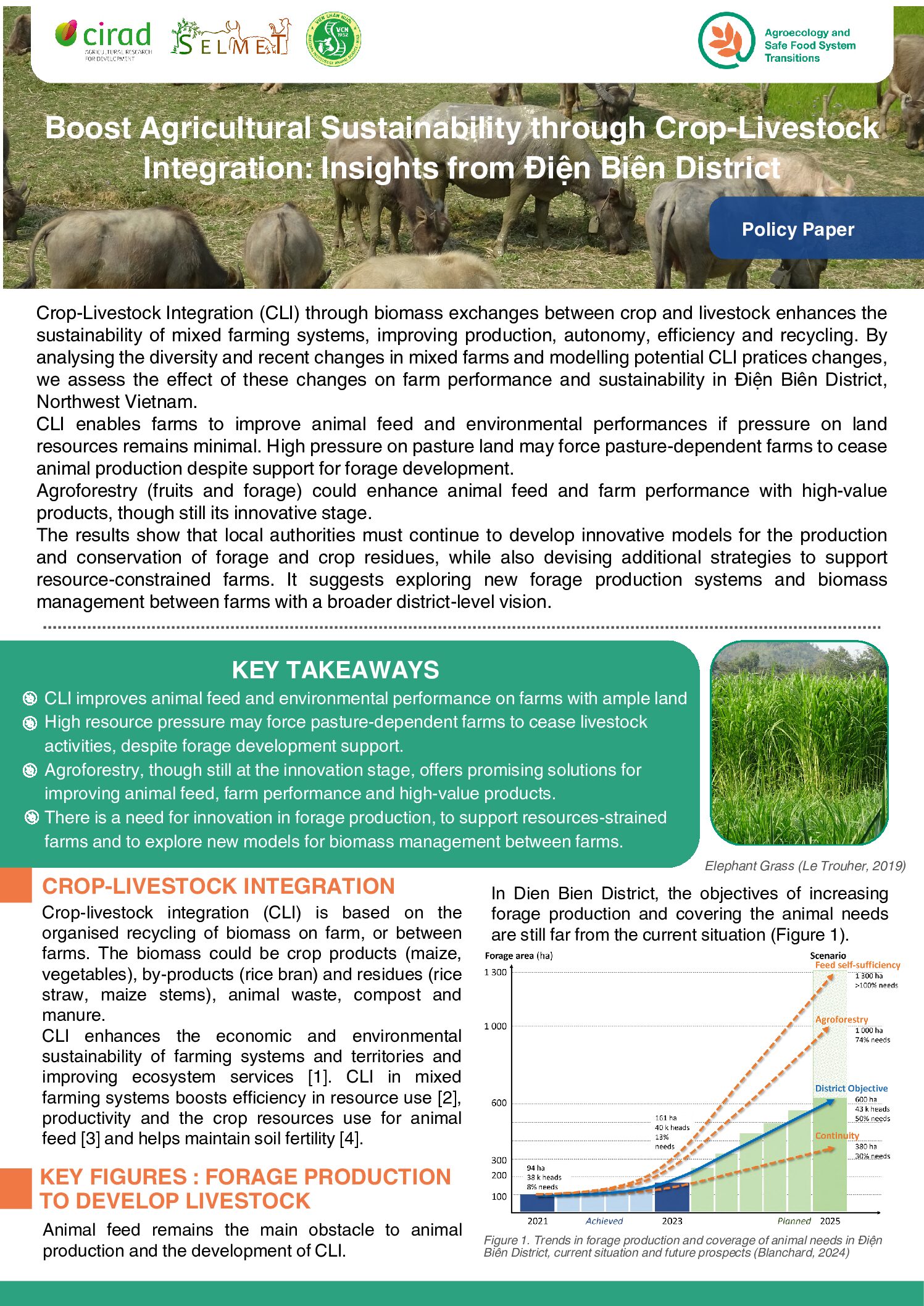
Tăng cường tính bền vững nông nghiệp thông qua Kết hợp Trồng trọt – Chăn nuôi: Bài học từ huyện Điện Biên
Kết hợp trồng trọt-chăn nuôii (Crop- livestock integration; CLI) thông qua trao đổi sinh khối giữa cây trồng và vật nuôi giúp tăng cường tính bền vững của các hệ thống canh tác hỗn hợp, cải thiện sản xuất, tính tự chủ, hiệu quả và tái chế. Bằng cách phân tích tính đa dạng và những thay đổi gần đây của các nông hộ và mô hình hóa các thay đổi trong thực hành CLI tiềm năng, chúng tôi đánh giá tác động của những thay đổi này đối với năng suất và tính bền vững của các nông hộ tại huyện Điện Biên, Tây Bắc Việt Nam. CLI giúp các nông hộ cải thiện nguồn thức ăn chăn nuôi và hiệu suất môi trường nếu áp lực lên tài nguyên đất vẫn ở mức tối thiểu. Áp lực cao lên đất đồng cỏ có thể buộc các hộ phụ thuộc vào chăn thả phải ngừng chăn nuôi ngay cả khi có chính sách hỗ trợ trồng cỏ. Nông lâm kết hợp (trồng cây ăn quả kết hợp trồng cây thức ăn thô xanh) có thể gia tăng nguồn thức ăn chăn nuôi và hiệu quả sản xuât của nông…
Seeds of Transformation: Agroecology in Siem Reap
This film captures the transformative journey of smallholder farmers in Siem Reap, Cambodia, as they shift from conventional, chemical-dependent farming to agroecological practices that restore soil health, biodiversity, and local livelihoods. Through the story of Ms. Thai Chhengly, a woman farmer who transitioned from selling vegetables to cultivating diverse, chemical-free crops, the film highlights how knowledge-sharing, local innovation, and community networks are rebuilding both ecosystems and economies. Developed under the GRET–APICI initiative in partnership with CIRAD, the documentary showcases the collective movement of over 1,800 farmers across 54 villages adopting sustainable, low-cost, and climate-resilient farming methods. It is a story of empowerment, regeneration, and hope—demonstrating how agroecology can secure food, livelihoods, and dignity for rural communities in a changing climate.
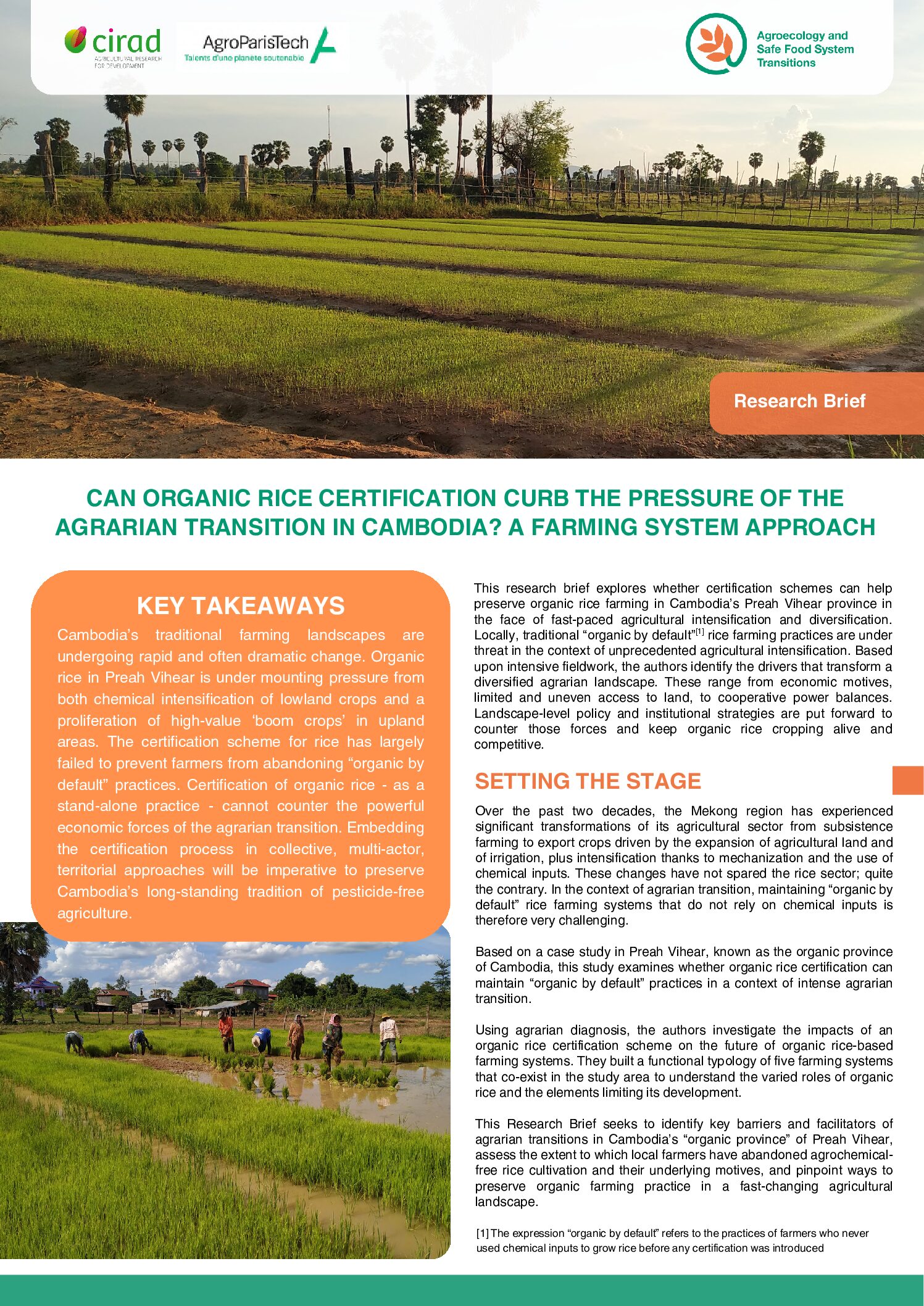
Can organic rice certification curb the pressure of the agrarian transition in Cambodia? A farming system approach
Over the past two decades, the Mekong region has experienced significant transformation of its agricultural sector from subsistence farming to export crops driven by the expansion of agricultural land and of irrigation, plus intensification thanks to mechanization and the use of chemical inputs. In the context of agrarian transition, maintaining “organic by default” rice farming systems that do not rely on chemical inputs, is challenging. Based on a case study in Preah Vihear, the organic province of Cambodia, this paper examines whether organic rice certification can maintain “organic by default” practices in a context of unprecedented agricultural intensification.
Participatory Rice Varieties Evaluation: Empowering Farmers Through Collaborative Assessment
How do Cambodian farmers choose the best rice for their local conditions and market needs? This video follows a participatory rice variety evaluation conducted in Preah Vihear province as part of an agroecology-based farming initiative. Together with farmers, researchers, and local stakeholders, the ASSET project tested 33 rice varieties to find those most suitable for rainfed and irrigated organic systems. Discover how farmers assessed yield, taste, pest resistance, and climate resilience through an inclusive six-step method. Learn which varieties stood out—and how this approach empowers farmers to lead in sustainable seed selection.








